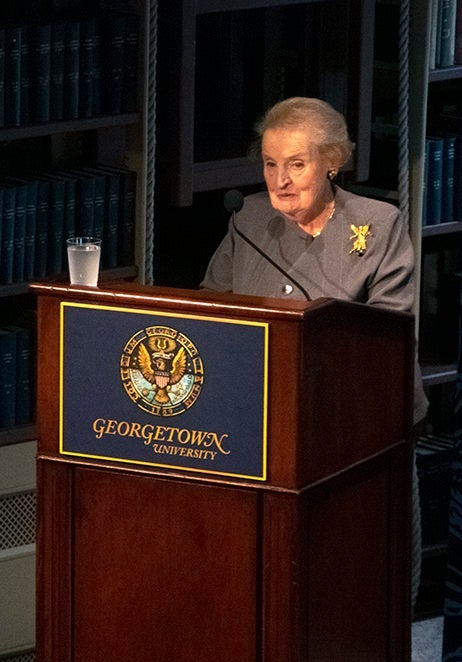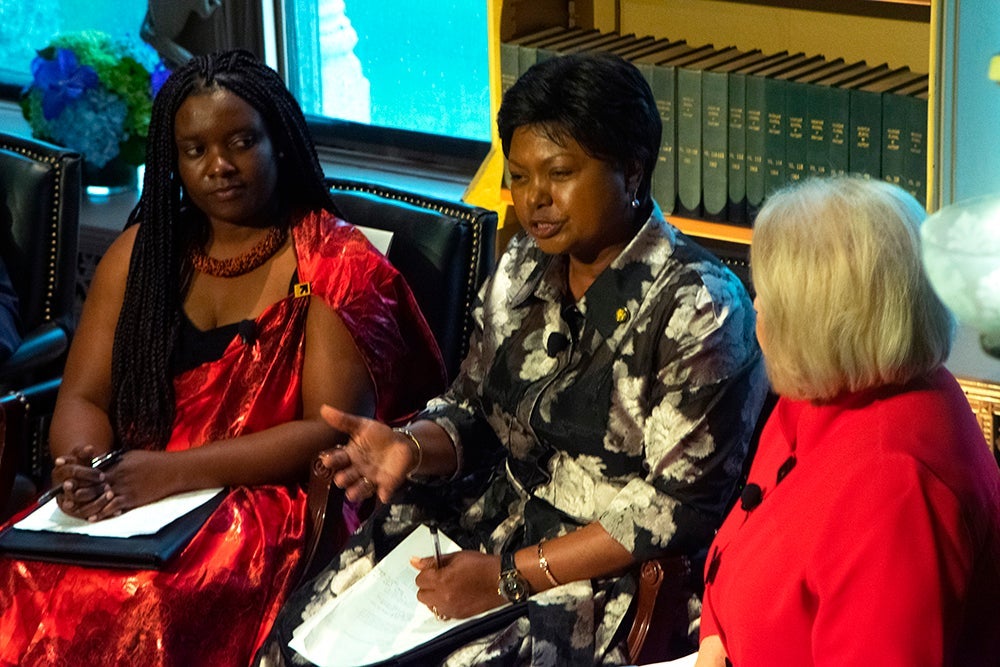Feminist Humanitarian Policy Launches at Georgetown
Event Details
Event Overview
The Georgetown Institute for Women, Peace and Security (GIWPS) partnered with former US Secretary of State Madeleine Albright to launch the International Rescue Committee (IRC)’s feminist humanitarian policy at Georgetown on Monday.
Women and girls in humanitarian settings face many insecurities and injustices, from gender-based violence, to child marriage, to maternal mortality.
A feminist humanitarian policy “tackles the symptoms of this disadvantage, but also address the power imbalances that generate it,” said IRC President and CEO David Miliband.
To date, humanitarian agencies have paid insufficient attention to these issues. According to new IRC research, less than 1% of humanitarian funding currently goes towards gender-based violence programs.
“This new framework aligns with our Georgetown Institute’s work to advance women’s agency in crisis settings, and advocate for women’s security so that they can meaningfully contribute to society,” said Amb. Melanne Verveer, executive director of GIWPS.
Lifting the Lives of Women and Girls

Albright reflected on her time as one of only seven women ambassadors to the United Nations. These women ambassadors formed a caucus, unofficially named the G7, and pledged to collaborate in order to magnify their influence. They helped ensure the appointment of women justices and prosecutors to the international war crimes tribunal.
“The result was that rape, for the first time, was classified as a war crime,” said Albright.
She has advocated for women and girls ever since.
“The world has recognized the need to do more to shield women from violence and to help women exercise their full potential as builders of peace,” said Albright. “Today, we come together not to reiterate those goals, but to explore specific ways to transform them into reality.”
A Feminist Approach to Humanitarian Work
The IRC has made strides to advance gender equality within its organization and the broader sector in recent years.
“But, we cannot content ourselves with carrying on as we are,” said Miliband.
Their new feminist approach is not about labeling, he said.
“It’s about understanding that additional inequalities and insecurities faced by women and girls in humanitarian settings are not just accidental by-products of trauma inherent in such situations,” explained Miliband. “The challenge laid down by feminist thinking is to take seriously those inequalities of power as drivers of violence or injustice that are themselves symptoms of deeper malaise.”
The IRC pledges to recruit and retain female staff, uphold the values of gender equality, and establish a culture of respect and support for female staff and beneficiaries. The organization has developed a Gender Equality Scorecard to track its progress and create accountability.
Miliband called on others in the humanitarian sector to adopt a similar approach. He proposed specific measures within crisis settings, including guaranteeing locks on all latrines and adequate lighting at all refugee camps, mandating that all peacekeeping missions include at least 5% of women in the force, and ensuring that women’s voices and perspectives have a place at the table in program design and assessment.
Empowering Women

Following his speech, Miliband joined Rwandan Ambassador Mathilde Mukantabana and IRC case officer and resettled refugee Marie Ngirimana in discussion. They spoke to the agency and empowerment of women.
“Women refugees are not victims…even in the worst of circumstances, they are always agents in their own lives,” said Ambassador Mukantabana.
Nigirimana echoed that sentiment, saying, “I want the women around me to be resilient, I want them to know their rights and values.”
Miliband and Verveer concluded by announcing joint research conducted by the IRC and GIWPS on the economic potential of refugee women, to be launched later this summer.